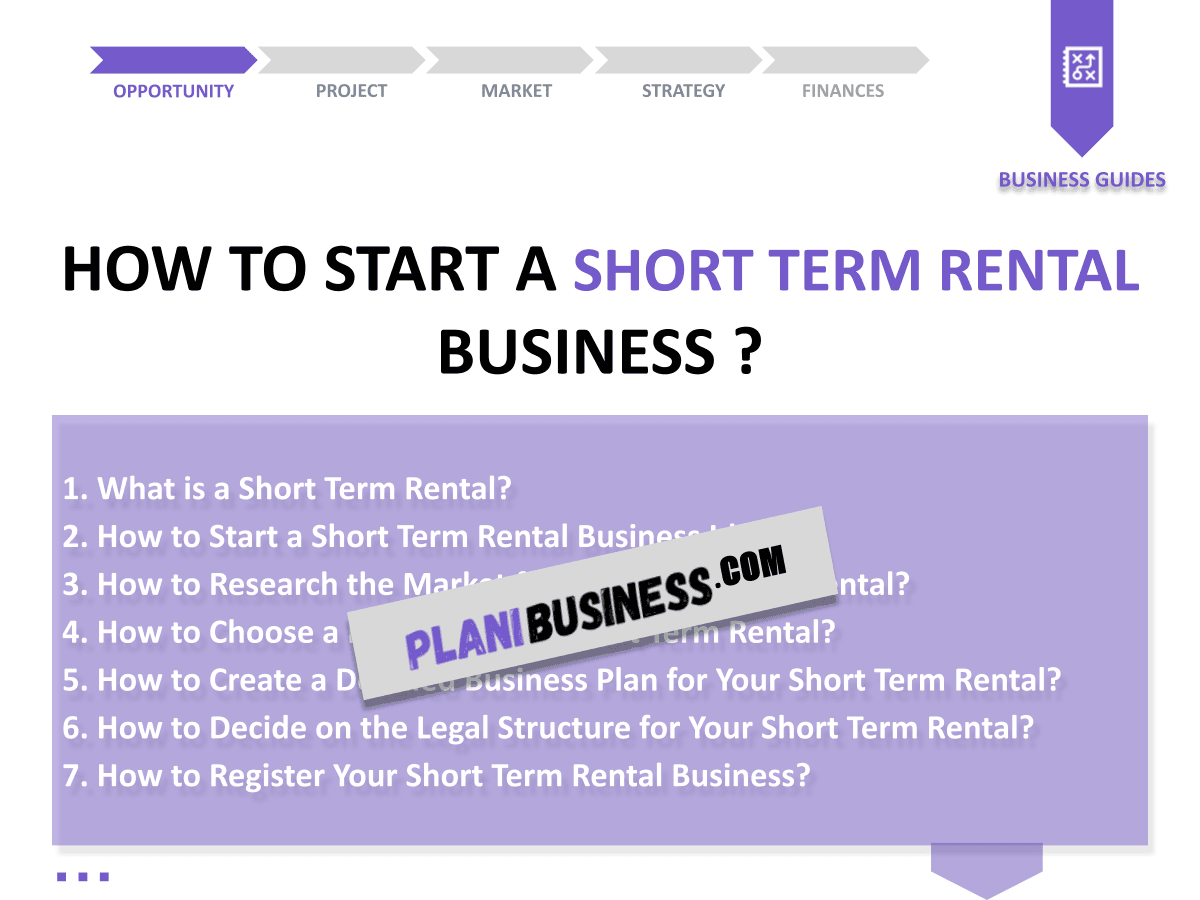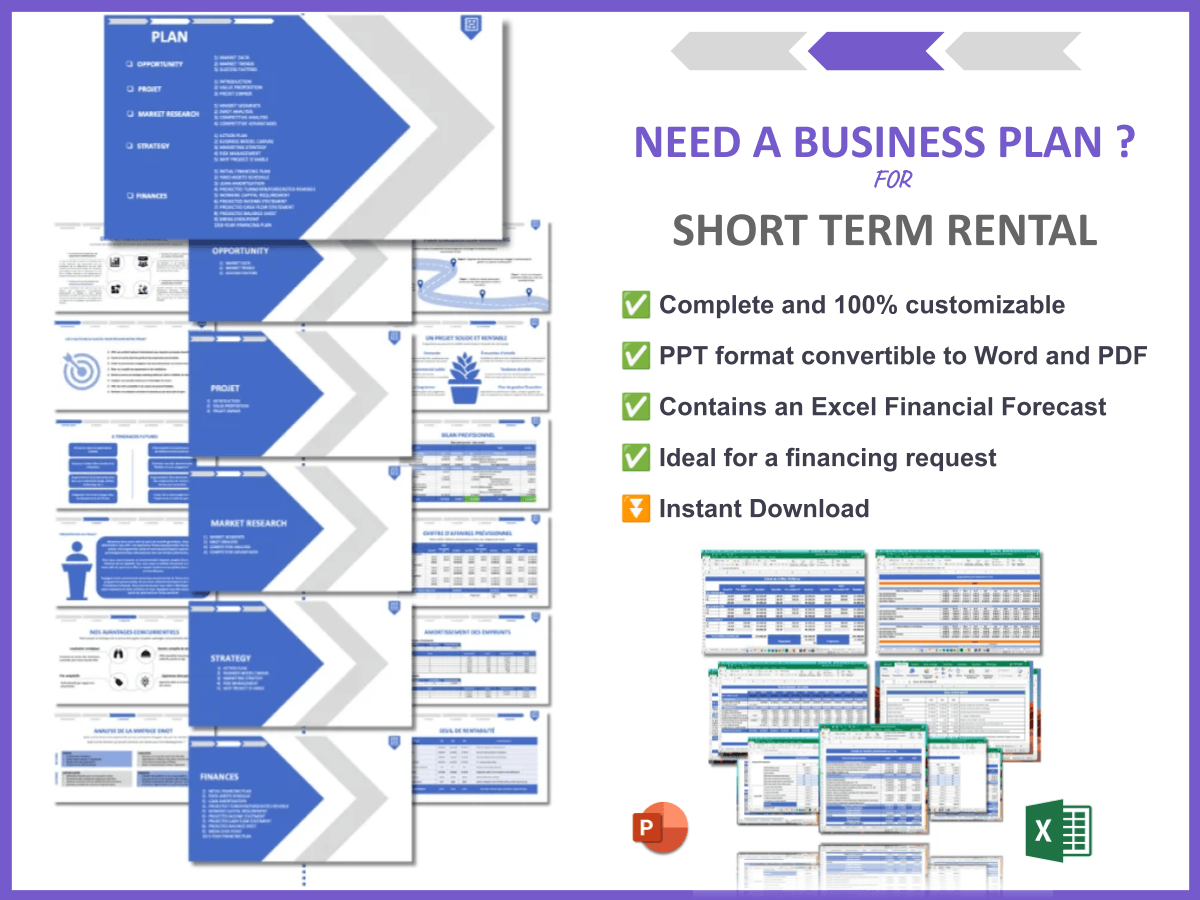Are you thinking about starting a short term rental business? You’re not alone! The short-term rental market has exploded in recent years, with platforms like Airbnb and Vrbo changing the way travelers find accommodations. In simple terms, a short term rental is a property rented out for a short duration, typically less than 30 days. This type of business can be incredibly lucrative if done right. But where do you even begin?
- Understanding the basics of short term rentals
- The benefits of starting a short term rental
- What to expect in the rental market
1. What is a Short Term Rental?
A short term rental is essentially a property that you rent out for a limited period, usually to tourists or business travelers. This could be anything from a cozy apartment in the city to a luxurious beach house. The best part? You can set your own rules and pricing!
In recent years, the popularity of short term rentals has surged. According to a recent study, around 20% of travelers prefer staying in rentals over hotels. This shift presents a fantastic opportunity for aspiring hosts. The flexibility and potential for high returns make it an attractive business venture.
However, it’s important to understand that running a short term rental isn’t just about listing your property online. There are various factors to consider, such as location, pricing, and guest experience. By taking the time to learn about the industry, you’ll set yourself up for success.
2. How to Start a Short Term Rental Business Idea?
The first step in your journey is to develop and refine your business idea. It’s not enough to just want to start a short term rental; you need a clear vision of what you want to achieve. Consider the following:
- Identify your target market: Are you aiming for families, couples, or business travelers? Understanding your audience will guide your decisions.
- Decide on the type of property: Will it be a single-family home, an apartment, or a unique property like a tiny house or a cabin? Each option has its pros and cons.
- Consider your unique selling proposition (USP): What makes your rental stand out? Maybe it’s a stunning view, unique decor, or proximity to attractions. Your USP will help attract guests.
In this stage, brainstorming is key. Write down all your ideas, no matter how wild they may seem. You never know which concept might turn into a successful business!
3. How to Research the Market for Your Short Term Rental?
Once you have a solid idea for your short term rental business, the next step is to research the market and assess your competitors. This is crucial for understanding what works and what doesn’t in your area. Here are some steps to guide your research:
- Analyze local listings: Check platforms like Airbnb, Vrbo, and Booking.com to see what similar properties are available.
- Note pricing strategies: Take note of the pricing for different types of properties. Are they charging a premium for certain amenities?
- Read guest reviews: Reviews can provide valuable insights into what guests appreciate and what they feel is lacking.
Additionally, consider visiting properties in person if possible. This gives you a feel for the competition and can inspire your own short term rental setup.
| Competitor | Price Range | Key Features |
|---|---|---|
| Charming Downtown Loft | $120 – $180 | Modern amenities, close to nightlife, free parking |
| Seaside Cottage | $200 – $350 | Beach access, pet-friendly, large patio |
This table summarizes some local competitors, showcasing how they position themselves in the market. Understanding their strengths can help you carve out your niche.
4. How to Choose a Name for Your Short Term Rental?
Choosing a name for your short term rental is more important than you might think. A catchy, memorable name can attract guests and make your property stand out. Here are some tips to help you brainstorm:
- Incorporate local landmarks or themes: Think about names that reflect your area’s unique characteristics, like “Mountain View Cabin” or “City Center Suite.”
- Keep it short and sweet: A name that’s easy to remember will stick with potential guests.
- Make sure the name is easy to spell: Avoid complex words that might confuse guests searching for your property online.
Once you have a few ideas, test them out! Share them with friends or family to see which ones resonate. You could even create a poll on social media to gather opinions from potential guests.
Remember, your rental name is part of your brand identity. It sets the tone for what guests can expect when they stay with you, so choose wisely!
5. How to Create a Detailed Business Plan for Your Short Term Rental?
Creating a business plan is vital to your success in the short term rental industry. A well-structured business plan helps you clarify your goals, strategies, and financial projections. Here are the essential components to include in your plan:
- Executive Summary: A brief overview of your business idea, including your mission and vision.
- Market Analysis: Insights from your research, such as target market demographics, competitor analysis, and market trends.
- Marketing Strategy: How you plan to attract guests, including pricing, advertising, and promotional efforts.
- Financial Projections: Estimated income, expenses, and profitability over the first few years.
For a more structured approach, consider utilizing a template. I recommend checking out this business plan template for Short Term Rental. It’s super detailed and can save you a ton of time!
Having a solid business plan not only helps you stay organized but also makes it easier to secure funding if you decide to seek investors or loans.
6. How to Decide on the Legal Structure for Your Short Term Rental?
Choosing the right legal structure for your short term rental is crucial for protecting your personal assets and minimizing tax liabilities. Here are the common options:
- Sole Proprietorship: The simplest form, where you run the business as an individual. It’s easy to set up but offers no personal liability protection.
- Limited Liability Company (LLC): This structure provides liability protection and allows for pass-through taxation. It’s a popular choice among rental owners.
- Corporation: More complex and expensive to set up, but it can offer additional liability protection and tax benefits.
Consider your long-term goals and consult with a legal professional to determine the best option for your situation. Here’s a quick comparison table to help you understand the pros and cons of each structure:
| Structure | Pros | Cons |
|---|---|---|
| Sole Proprietorship | Easy setup, full control | No personal liability protection |
| LLC | Limited liability, tax flexibility | More paperwork, ongoing fees |
| Corporation | Strong liability protection, potential tax benefits | Complex setup, higher costs |
Understanding these structures will help you make informed decisions and set a solid foundation for your short term rental business.
7. How to Register Your Short Term Rental Business?
Once you’ve decided on a name and legal structure for your short term rental business, it’s time to make it official by registering your business. This process varies depending on your location, but here are the general steps you should follow:
- Choose a business name: Make sure it’s unique and complies with your local regulations.
- File necessary documents: Depending on your legal structure, you may need to file Articles of Incorporation or a DBA (Doing Business As) form.
- Pay registration fees: Most jurisdictions require a fee to register your business. Check with your local government for specifics.
In addition to registering your business name, you may also want to check if you need to register for a business license. This is often required for rental businesses, especially in tourist areas. Be sure to do your homework to avoid any legal issues down the line!
8. How to Obtain Necessary Licenses and Permits for Your Short Term Rental?
Obtaining the right licenses and permits is essential for running a legitimate short term rental business. Each city or state has its own regulations, so it’s important to research what applies to your area. Here’s a general guideline:
- Check local regulations: Visit your city or county’s website to find out what licenses and permits are required.
- Gather required documents: This may include proof of ownership, insurance documents, and safety inspection certificates.
- Submit applications: Fill out the necessary forms and submit them to the appropriate local agencies.
Some common licenses and permits you might need include:
| License/Permit | Description |
|---|---|
| Business License | Required to operate any business legally. |
| Short Term Rental Permit | Specific to rental properties, ensuring compliance with local laws. |
| Tax ID Number | Needed for tax purposes, especially if you’ll be collecting occupancy taxes. |
By ensuring that you have all the necessary licenses and permits, you’ll not only avoid potential fines but also build trust with your guests, showing them that you operate a professional and compliant short term rental business.
9. How to Set Up Your Financial Management Systems for Your Short Term Rental?
Setting up financial management systems is key to ensuring the success of your short term rental business. Proper financial management will help you track your income and expenses, which is vital for making informed decisions. Here are some steps to consider:
- Choose accounting software: Select a user-friendly platform that can help you manage your finances efficiently. Options like QuickBooks or FreshBooks are popular choices.
- Set up a separate bank account: Keeping your rental income separate from your personal finances will simplify bookkeeping and tax preparation.
- Track all expenses and income: Regularly update your financial records to ensure accuracy. This includes everything from maintenance costs to cleaning fees.
Creating a budget is also an essential part of your financial management. Consider including categories such as:
| Category | Estimated Monthly Expense |
|---|---|
| Utilities | $100 – $300 |
| Cleaning Services | $50 – $150 |
| Maintenance and Repairs | $50 – $200 |
| Marketing Costs | $30 – $100 |
By closely monitoring these expenses, you’ll have a clearer picture of your profitability and can make adjustments as needed.
10. How to Establish Your Brand Identity for Your Short Term Rental?
Your brand identity is crucial for attracting guests to your short term rental. It reflects who you are and what you stand for. Here are some steps to help you establish a strong brand identity:
- Define your brand values: What do you want your guests to feel when they stay at your property? Consider elements like comfort, luxury, or adventure.
- Create visual elements: Develop a logo, color scheme, and design style that reflects your brand. Consistency across all platforms is key.
- Consistently communicate your brand: Use your brand voice in all your marketing materials, from your website to social media posts.
Remember, your brand identity should resonate with your target audience. Conduct surveys or gather feedback to ensure your branding aligns with what your guests want. An effective brand identity not only attracts guests but also helps build loyalty, encouraging repeat bookings.
11. How to Develop a Professional Website for Your Short Term Rental?
In today’s digital age, having a professional website for your short term rental is essential. It serves as your online storefront and can significantly impact your booking rates. Here are some key elements to include:
- High-quality images: Showcase your property with stunning photos that highlight its best features. Consider hiring a professional photographer for this.
- Booking options: Integrate a booking calendar that allows guests to check availability and make reservations easily.
- Contact information: Make it easy for potential guests to reach you. Include a contact form, phone number, and email address.
Additionally, ensure that your website is optimized for search engines (SEO). Use relevant keywords throughout your content, such as short term rental, to improve your visibility online.
Here’s a quick checklist for your website:
- Mobile-friendly design
- Clear navigation menu
- Guest reviews section
- Blog for sharing local tips and updates
12. How to Market and Advertise Your Short Term Rental?
Marketing your short term rental effectively is crucial for attracting guests. Here are some strategies you can use:
- Leverage social media: Use platforms like Instagram and Facebook to showcase your property. Share beautiful images and engage with potential guests.
- Utilize online booking platforms: List your property on platforms like Airbnb, Vrbo, and Booking.com to reach a broader audience.
- Network with local businesses: Collaborate with local tour operators or restaurants to offer guests special deals or packages.
Consider running targeted ads on social media or Google to reach specific demographics. Analyze the performance of your marketing efforts regularly to determine what works best.
Here’s a simple table to help you track your marketing channels:
| Marketing Channel | Cost | Expected ROI |
|---|---|---|
| Social Media Ads | $100 – $300 | 10% increase in bookings |
| Online Booking Platforms | Varies (usually a percentage of booking) | 15% increase in visibility |
| Local Partnerships | Minimal (mostly promotional) | 20% increase in guest referrals |
13. How to Assemble Your Team for Your Short Term Rental?
As your short term rental business grows, you may need to assemble a team to help manage operations effectively. Here are some roles to consider:
- Property Manager: A professional who can handle day-to-day operations, guest communication, and maintenance.
- Cleaning Staff: Reliable cleaners are essential for maintaining high standards of cleanliness and guest satisfaction.
- Marketing Specialist: If you’re not comfortable with marketing, consider hiring someone to help promote your rental and manage social media.
When hiring, look for individuals who share your vision and values. Training your team to uphold your brand standards will ensure a consistent guest experience.
Remember, a strong team can help you scale your short term rental business and improve overall guest satisfaction, leading to positive reviews and repeat bookings.
Conclusion
Starting a short term rental business can be an exciting and profitable venture if approached with the right knowledge and strategies. By following the steps outlined in this article, from conducting market research to developing a solid marketing plan, you’ll be well on your way to success. Remember, it’s all about providing an exceptional experience for your guests and managing your property efficiently.
As you continue your journey, consider exploring additional resources to enhance your understanding. For instance, check out our article on how to create a SWOT Analysis for Short Term Rental, which can help you identify your strengths and weaknesses. Additionally, our guide on How to Initiate a Short Term Rental Marketing Plan? With Example offers valuable insights into promoting your rental effectively. Good luck on your new adventure!
FAQ
- What is a short term rental?
A short term rental is a property rented out for brief periods, typically less than 30 days, to travelers or guests seeking temporary accommodations. - How do I start a short term rental business?
To start, develop your business idea, conduct market research, choose a property, register your business, and create a marketing plan. - What are the legal requirements for short term rentals?
Legal requirements vary by location but may include obtaining a business license, short term rental permit, and compliance with local zoning laws. - How do I market my short term rental?
Utilize social media, online booking platforms, and local partnerships. Consider running ads and engaging with potential guests through various channels. - What are the benefits of short term rentals?
Benefits include flexibility in pricing, potential for higher income compared to long-term rentals, and the opportunity to meet diverse guests. - How do I set pricing for my short term rental?
Research competitors in your area, analyze seasonal trends, and consider your property’s unique features when setting competitive prices. - How can I improve guest experience in my rental?
Focus on cleanliness, provide clear communication, offer local tips, and ensure that your property has essential amenities for a comfortable stay. - Do I need insurance for my short term rental?
Yes, obtaining insurance specifically for short term rentals is crucial to protect your property and cover liabilities. - What platforms can I use to list my short term rental?
Popular platforms include Airbnb, Vrbo, Booking.com, and HomeAway, each offering different features and audience reach. - How do I handle guest complaints?
Respond promptly and professionally to complaints. Listen to your guests, offer solutions, and ensure they feel valued to maintain a positive reputation.







